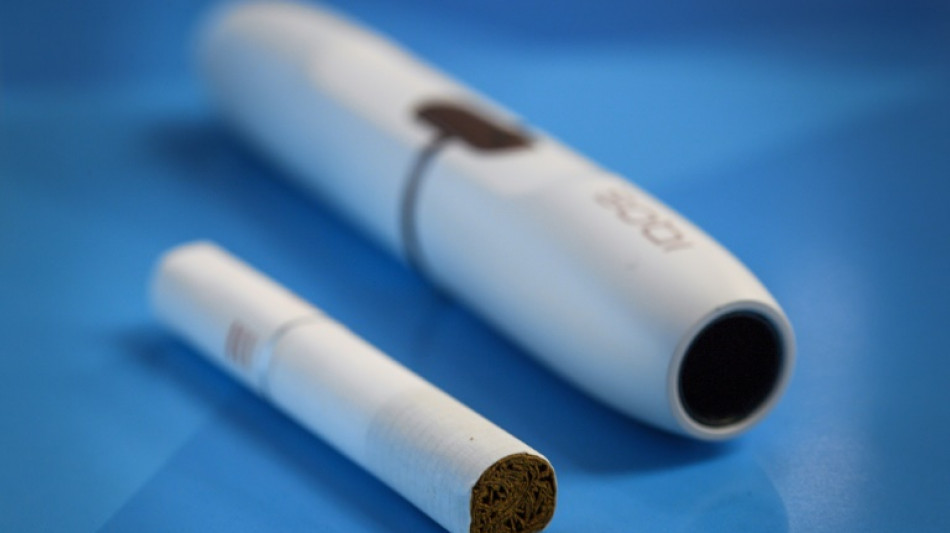
-
 Trump tells Iranians to 'keep protesting', says 'help on its way'
Trump tells Iranians to 'keep protesting', says 'help on its way'
-
Italian Olympians 'insulted' by torch relay snub

-
 Davos braces for Trump's 'America First' onslaught
Davos braces for Trump's 'America First' onslaught
-
How AI 'deepfakes' became Elon Musk's latest scandal

-
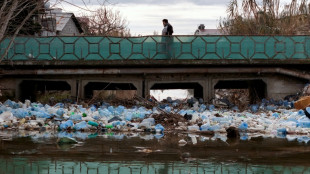 Albania's waste-choked rivers worsen deadly floods
Albania's waste-choked rivers worsen deadly floods
-
Cancelo rejoins Barca on loan from Al-Hilal

-
 India hunts rampaging elephant that killed 20 people
India hunts rampaging elephant that killed 20 people
-
Nuuk, Copenhagen mull Greenland independence in Trump's shadow

-
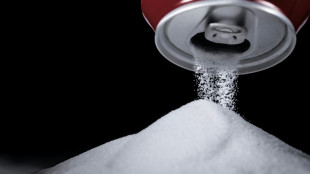 WHO says sugary drinks, alcohol getting cheaper, should be taxed more
WHO says sugary drinks, alcohol getting cheaper, should be taxed more
-
Arteta urges Arsenal to learn from League Cup pain ahead of Chelsea semi

-
 Davos elite, devotees of multilateralism, brace for Trump
Davos elite, devotees of multilateralism, brace for Trump
-
Spanish star Julio Iglesias accused of sexual assault by two ex-employees
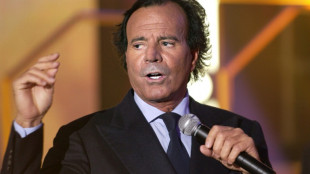
-
 Trump's Iran tariff threat pushes oil price higher
Trump's Iran tariff threat pushes oil price higher
-
US consumer inflation holds steady as affordability worries linger
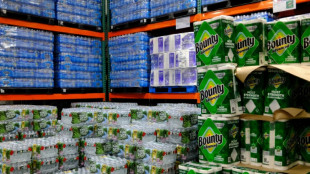
-
 Iran to press capital crime charges for 'rioters': prosecutors
Iran to press capital crime charges for 'rioters': prosecutors
-
Denmark, Greenland set for high-stake talks at White House

-
 Iranian goes on trial in France ahead of possible prisoner swap
Iranian goes on trial in France ahead of possible prisoner swap
-
Cold winter and AI boom pushed US emissions increase in 2025
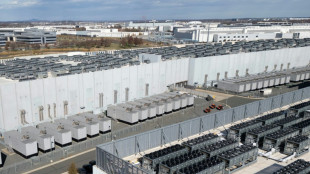
-
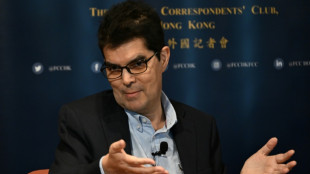 Hong Kong activist investor David Webb dies at 60
Hong Kong activist investor David Webb dies at 60
-
Try to be Mourinho and I'll fail: new Real Madrid coach Arbeloa

-
 Vingegaard targets Giro d'Italia and Tour de France double
Vingegaard targets Giro d'Italia and Tour de France double
-
South Korean prosecutors demand death penalty for ex-leader Yoon

-
 Iwobi hails Nigerian 'unity' with Super Eagles set for Morocco AFCON semi
Iwobi hails Nigerian 'unity' with Super Eagles set for Morocco AFCON semi
-
Le Pen appeal trial opens with French presidential bid at stake

-
 Iran ex-empress urges security forces to join protesters
Iran ex-empress urges security forces to join protesters
-
Sudan 'lost all sources of revenue' in the war: finance minister to AFP

-
 Freezing rain hampers transport in Central Europe
Freezing rain hampers transport in Central Europe
-
Nuuk, Copenhagen cautiously mull Greenland independence

-
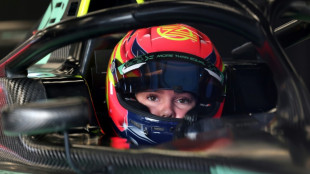 'Proving the boys wrong': Teenage racers picked for elite driver programme
'Proving the boys wrong': Teenage racers picked for elite driver programme
-
Mbappe absent from training as Arbeloa takes charge at Real Madrid

-
 Iran worries push up oil price as world stocks diverge
Iran worries push up oil price as world stocks diverge
-
Volvo Cars pauses battery factory after fruitless partner search

-
 Social media harms teens, watchdog warns, as France weighs ban
Social media harms teens, watchdog warns, as France weighs ban
-
Central bank chiefs voice 'full solidarity' with US Fed, Powell

-
 Greece airspace shutdown exposes badly outdated systems
Greece airspace shutdown exposes badly outdated systems
-
France climate goals off track as emissions cuts slow again

-
 Boeing sells 50 737 MAX jets to leasing group ACG
Boeing sells 50 737 MAX jets to leasing group ACG
-
Freezing rain paralyses transport in Central Europe

-
 Man Utd reach deal to appoint Carrick as interim boss: reports
Man Utd reach deal to appoint Carrick as interim boss: reports
-
Trump hits Iran trade partners with tariffs as protest toll soars

-
 Is China a threat to Greenland as Trump argues?
Is China a threat to Greenland as Trump argues?
-
Takaichi says urged S. Korea's Lee to help 'ensure regional stability'

-
 South Korean prosecutors set to demand heavy sentence for Yoon
South Korean prosecutors set to demand heavy sentence for Yoon
-
Honduras electoral authorities reject vote recount

-
 Tractors in Paris to protest EU's trade deal with S. America
Tractors in Paris to protest EU's trade deal with S. America
-
Asian markets rise, Iran worries push up oil

-
 Williams loses golden oldie clash in final Australian Open warm-up
Williams loses golden oldie clash in final Australian Open warm-up
-
Kyrgios stands by decision to skip Australian Open singles

-
 Disaster losses drop in 2025, picture still 'alarming': Munich Re
Disaster losses drop in 2025, picture still 'alarming': Munich Re
-
Williams, 45, loses in first round of final Australian Open warm-up

| SCS | 0.12% | 16.14 | $ | |
| CMSC | -0.21% | 23.26 | $ | |
| BCC | -0.21% | 82.79 | $ | |
| RIO | 1.07% | 83.775 | $ | |
| NGG | -2.7% | 77.66 | $ | |
| GSK | -0.9% | 49.94 | $ | |
| RBGPF | 1.13% | 82.5 | $ | |
| CMSD | -0.44% | 23.761 | $ | |
| BCE | -0.32% | 23.765 | $ | |
| JRI | -0.15% | 13.79 | $ | |
| RYCEF | -0.06% | 17.28 | $ | |
| VOD | -2.61% | 13.205 | $ | |
| BP | 1.95% | 35.095 | $ | |
| AZN | 0.39% | 94 | $ | |
| BTI | 1.51% | 56.535 | $ | |
| RELX | -1.6% | 42.095 | $ |

Smoke without fire? Researchers question heated tobacco products
Heated tobacco products have soared in popularity as a "smoke free" alternative to cigarettes in recent years, but a peer-reviewed report has suggested their emissions could be considered smoke -- a claim strongly rejected by the tobacco industry.
Heated tobacco products, or HTPs, are often confused with e-cigarettes, which heat liquid that can contain nicotine but do not involve tobacco leaf.
HTPs instead use a high heat to decompose tobacco, via a process called pyrolysis, which does not set it on fire or burn it, therefore avoiding creating smoke.
The most popular and widely available HTP, Philip Morris International's IQOS, is an electronic device that heats a tobacco-filled, paper-wrapped, cigarette-like stick at a temperature of up to 350 degrees Celsius (662 degrees Fahrenheit).
Last month a review of the available research by experts in pyrolysis from Britain's Nottingham University found "chemical evidence that IQOS emissions fit the definition of both an aerosol and smoke."
The paper, published in the American Chemical Society's Omega journal, was funded by the STOP anti-tobacco initiative.
Its lead author Clement Uguna said that IQOS emissions contain chemical compounds that are "in normal tobacco smoke, bush burning and wood smoke".
"Hence smoke arises simply by heating organic substances and does not necessarily involve fire," he told AFP.
The paper also found that previous research on IQOS -- the majority of which has been funded by the tobacco industry -- had compared a stick to a typical cigarette.
However IQOS sticks are much smaller, containing around 200 milligrams of tobacco compared to 645 milligrams for a standard cigarette, it said.
Because research by Philip Morris International (PMI) did not use a "like against like" comparison, it "underestimated" the levels of harmful and potentially harmful constituents (HPHCs) from IQOS, the review added.
PMI said the level of HPHCs in IQOS emissions -- per stick -- was "reduced on average by 90-95 percent compared to cigarette smoke".
However that level fell to 68 percent when comparing the tobacco content of the two products, the Nottingham University experts said, calling for more research.
- 'Not smoke': PMI -
PMI told AFP that the paper "misleadingly leverages pieces of the scientific assessment while omitting other important pieces of evidence".
"Numerous international combustion experts and a number of government agencies have reviewed the same evidence package and concluded that the IQOS aerosol produced is not smoke," it said.
Reto Auer, a doctor at Germany's University of Bern who has previously researched heated tobacco, praised the Omega paper, telling AFP it was "one of the rare reports to dare to tackle the question of 'smoke' so deeply".
Jamie Hartmann-Boyce of the Centre for Evidence-Based Medicine at Oxford University, an author of a highly regarded review on HTP science published earlier this year, said the "important" paper "made some very good points".
"I think mechanistically there are a lot of reasons to suspect HTPs might be more harmful than e-cigarettes and possibly less harmful than traditional cigarettes -- but we really need more data," she told AFP.
- 'Difficult balance' -
IQOS is available in more than 60 countries under widely varying regulations, and sticks come in flavours such as menthol, cherry and grape, which critics say help attract younger users.
Last month the European Commission proposed banning flavoured HTP varieties after stick sales in the EU soared more than 2,000 percent -- from 934 million to nearly 20 billion -- between 2018 and 2020.
PMI told AFP that the "proposal from the Commission is not underpinned by evidence".
"It fails to prove, for instance, that flavours pose any additional health risks or that they attract a significant proportion of non-nicotine users," it said.
Hartmann-Boyce said "there is every reason to be concerned about the extent to which the tobacco industry is manipulating the science and messages around new tobacco products."
But she warned it was a "difficult balance" to communicate the risks of such products because of the overwhelming damage done by cigarettes. Tobacco kills half its users, according to the World Health Organization.
"If we say something is safer than cigarettes, that is not saying it's safe -- it's like saying that this knife is safer than a loaded gun," Hartmann-Boyce said.
D.Khalil--SF-PST



